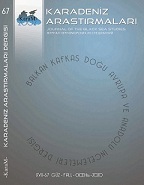ÂŞIK SEYRÂNÎ’NİN ARUZ VEZNİYLE YAZILMIŞ ŞİİRLERİNDE ÂYET İKTİBASLARI
VERSE QUOTATIONS OF ÂŞIK SEYRÂNÎ IN HIS POEMS WRITTEN IN ARUZ PROSODY
Author(s): İsmail YildirimSubject(s): Studies of Literature, Islam studies, Turkish Literature, 19th Century
Published by: Karadeniz Araştırmaları Merkezi
Keywords: Âşık Seyrânî; Aruz Prosody; the Holy Quran; Verse Quotations;
Summary/Abstract: The tradition of minstrelsy is not only the representation of the social memory of Anatolia but also its cultural diversity and richness. This art, which was shaped through the experiences of hundreds of years with a unique tradition, reflected the life of the time, its perspective on life, ethic and aesthetic values, appealing to large communities. In this context, the tradition of Minstrelsy brought up hundreds of minstrels who attempted to produce a work of art on their own fields. Develili Âşık Seyrânî is one of them. Âşık Seyrânî, who was born in Develi (formerly named as Everek) district of Kayseri province in 1800 (H. 1215), is one of the leading figures in folk poetry. In his poems, he sometimes described a beloved one or yearnings for her, and sometimes he reflected the unlawfulness in the society. Seyrânî also wrote poems that particularly glorify the spiritual personalities of famous religious figures. Therefore, having a wide content in his poems, Seyrânî sang pleasantly all of this mentality in poems that were written in syllabic meter and aruz prosody. Although his poems written in aruz prosody are problematic concerning the rhythm, rhyme, and redif, they have a large content. Additionally, his poems compiled in aruz prosody were not kept off the aesthetic pleasure and arts, and he enriched his poems through referencing the verses of the Qur’an in sufistic subjects he handled. In this regard, the poet demonstrated his artistry through combining the common grounds of folk poetry and Ottoman poetry. In this paper, initially the personality and life of Âşık Seyrânî will be examined and his verse quotations will be discussed in his poems written in aruz prosody.
Journal: Karadeniz Araştırmaları
- Issue Year: 2020
- Issue No: 67
- Page Range: 799-812
- Page Count: 14
- Language: Turkish

